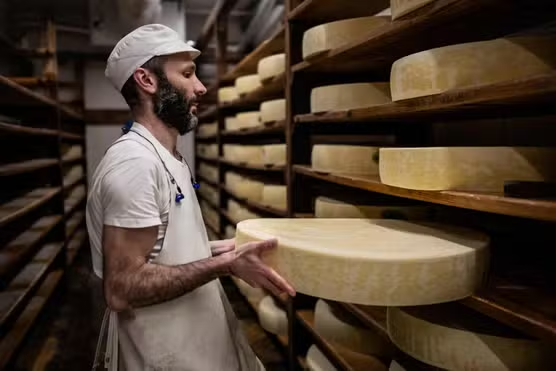
A controversy surrounding France’s beloved comté cheese has ignited a fierce political and public debate, highlighting tensions between environmental concerns and traditional agricultural practices.
The uproar erupted after a May 10 article in the French weekly Le Figaro Magazine suggested that the Green party intended to ban comté production, sparking widespread backlash across the French political right and regional defenders of the cheese.
Comté, a staple of French culinary heritage and the sixth most consumed cheese in France by volume, is made in the Jura region of eastern France.
The article quoted naturalist Pierre Rigaux, who in a radio interview on France Inter expressed concern over the environmental impact of livestock farming in the Jura, including pollution in local rivers and issues of animal welfare.
However, Rigaux never called for a ban on comté, and his remarks were personal reflections rather than official party policy.
Despite this nuance, the Le Figaro Magazine headline ignited outrage. Conservative politicians including Laurent Wauquiez, a presidential candidate for Les Républicains, and Agriculture Minister Annie Genevard rallied to defend comté under the hashtag #TouchePasAuComté (#HandsOffComté).
The prefect of Jura also voiced support for the cheese, underscoring its cultural and economic significance to the region.
In response, Marine Tondelier, leader of the Green party, issued a statement clarifying that her party never advocated stopping comté consumption. “The Greens support the comté industry,” Tondelier said. “It is because we love this cheese, a jewel of our heritage and a pillar of the regional economy, that we want it to remain synonymous with quality – for our taste buds as well as for our rivers.”
The controversy sheds light on deeper environmental issues affecting the Franche-Comté region, where comté is produced. Over recent decades, production has doubled to nearly 70,000 metric tons annually, coinciding with the slow eutrophication and pollution of several rivers, including the Loue.
Environmental group SOS Loue et rivières comtoises has raised alarms about the suffocation of waterways due to high concentrations of nitrogen and phosphorus from livestock effluents, fertilizers, and slurry spreading—common in dairy farming.
SOS Loue cautions, however, that the cheese industry is not solely to blame. Other factors such as outdated wastewater treatment, industrial discharges, wood treatment chemicals, and drought also contribute significantly to the environmental degradation.
In recent years, the comté industry has strengthened production standards and faced legal pressure to comply with environmental regulations.
Nonetheless, debates in the French National Assembly on legislation to ease regulations on farmers risk weakening environmental safeguards, raising fears that extensive grazing practices unique to comté production may decline.
Agathe Gignoux from Compassion in World Farming emphasized that loosening cattle farming regulations could undermine sectors that maintain more sustainable grazing.
She also advocated for consuming less cheese overall to prioritize quality over quantity and reduce environmental impact.
As the French public weighs its love for comté against growing ecological concerns, this controversy highlights the complex balance between preserving cherished regional products and addressing urgent environmental challenges.
The #HandsOffComté campaign reflects a broader struggle to reconcile tradition, economy, and sustainability in contemporary France.